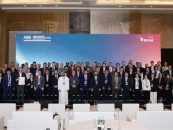
EBRD Significantly Boosted its Investments and Activities in Azerbaijan in Recent Years
An interview with Francis Delaey, Country Manager of European Bank for Reconstruction and Development to Azerbaijan.
AT: Could you please speak for us about the history of opening of the EBRD? Who are the founders?
The European Bank for Reconstruction and Development (EBRD) started its operations in 1991. The fall of the Berlin Wall in November 1989 marked the onset of a series of events that ultimately led to the collapse of communism in Central and Eastern Europe and the dis solution of the Soviet Union in December 1991. EBRD was specifically established to assist these countries to transit from planned economies to open market economies, primarily by financing private sector clients whose needs cannot be fully met by the market. Today EBRD is the single largest investor in Central and Eastern Europe and Central Asia, operating in 29 countries throughout the region. It is owned by two intergovernmental organizations and 61 countries, including Azerbaijan.
AT: When did EBRD begin functioning in Azerbaijan? How much has your bank invested in Azerbaijan’s economy?
Azerbaijan became a shareholder and country of operation of EBRD in September 1992. Since then EBRD has signed 114 projects for a cumulative business volume of €1.05 billion and a total project value of €5.6 billion. Approximately 44% of our current portfolio is invested in the energy sector. EBRD financed several landmark transactions such as BTC, ACG and Shah Deniz as well as three power projects with Azerenerji, our largest client in Azerbaijan. Tire remainder of the portfolio is invested in the corporate sector (23%), financial sector (19%) and infrastructure sector (14%).
AT: Could you tell us about the cooperation ties of EBRD with Azerbaijan government?
EBRD significantly boosted its investments and activities in Azerbaijan in recent years. We are committed to build on our cooperation with the government to further increase our activities Azerbaijan. In March 2010 EBRD’s President Thomas Mirow met with HE President Ilham Aliyev as well as various members of the government. The discussions were open and cordial and focused on existing activities as well as further areas of cooperation. EBRD is currently finalizing its country strategy for Azerbaijan for 2010 to 2013. The central theme of the strategy will be EBRD’s support to the development of Azerbaijan’s non-oil economy through investments in financial institutions, private enterprise and infrastructure.
AT: In your opinion is it necessary for the Azerbaijan government to improve the investment environment in the legislative, judicial, tax, customs spheres, and additionally in some other spheres?
The government has made economic diversification a cornerstone of its development strategy to reduce Azerbaijan’s dependence on oil and gas, create employment and lay the foundations for long-term sustainable growth. To do this the government needs to create a business enabling environment. Azerbaijan successfully attracted large investments into the oil and gas sector by creating a favorable operating environment for investors. The government needs to recreate this success, to attract investments in the non-oil economy.
Some steps have been taken to improve the business environment as recognized by the World Bank’s Doing Business 2009 report which ranks Azerbaijan as the top reformer in 2008. Following the streamlining of business registration, the government should promote deregulation, dismantle informal barriers and simplify licensing and permit requirements. Creating a level playing field and upholding the rule of law would encourage the entry of new players and promote competition. The government should also expedite ongoing reforms at customs and tax administration. Cumbersome procedures and arbitrary practices encourage companies to stay small and operate in the grey economy. In response to these concerns, the government adopted a State Program for Reform of Customs in 2008 as well as various improvements to the tax administration such as electronic tax filing. To encourage companies to operate officially and attract investments in the non-oil economy, the government should deepen these reforms.
AT: What do you think of the Azerbaijan government’s privatization policy, taking into consideration that the enterprises of electricity production, oil, Caspian shipping and so on are still under government control?
Privatization is not an end in itself. In addition to generating revenues for the government, a successful privatization should pay long-term dividends to the economy as a whole in the form of productivity gains, increased efficiency, innovation, competition and the creation of sustainable employment. EBRD has successfully supported the privatization of state-owned enterprises in other countries and would be pleased to share its experience with title government of Azerbaijan.
AT: Which non-oil sectors in Azerbaijan are you interested in?
EBRD covers the whole spectrum of corporate, financial and infrastructure sectors. In Azerbaijan we have financed among others financial intermediaries (banks, microfinance institutions, leasing and insurance companies), corporate clients in natural resources, agribusiness, construction materials and telecommunications as well as several infrastructure projects in the transport and power sector. EBRD provides equity and debt financing tailored to the needs of our clients and can finance both existing operations and greenfield projects. As mentioned before we want to continue increasing our activities in Azerbaijan and we welcome investment proposals in all economic sectors.





